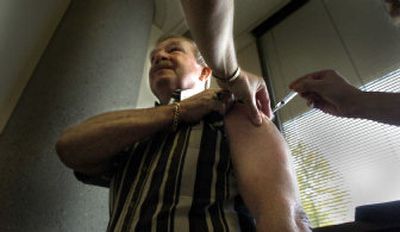Supply of flu shots appears plentiful

Susan Cuff experienced a bout of déjÀ vu last week when she sent out a notice announcing the first of the season’s flu shot clinics for Panhandle Health District.
A year ago almost to the day she issued a similar announcement, “and the very next day we got the word that the supply was going to be cut severely,” she recalled.
Public health officials so far don’t anticipate any shortages this year and are forging ahead with clinics and appointments.
The shortage of flu vaccine last year increased the demand for flu shots in what turned out to be a mild year for influenza, Cuff said. The lack of vaccine touched off a debate over the national vaccine supply. while closer to home senior citizens stood in line for hours in the rain last October waiting to get a flu shot.
Even though flu vaccine became available later in the season, some people gave up when the shortage was acute early in the season, said Julie Graham, spokeswoman for the Spokane Regional Health District.
“It was a big challenge for everybody last year,” she said. “We only received half our regular supply, and we got it all out the door. It meant that not everybody who was high risk was able to get a shot. …
“It was a light season, thankfully.”
In Idaho, the Panhandle Health District is using its first doses of the flu vaccine to inoculate residents of assisted living centers, and then they’ll open up flu shots for the general public at a clinic Nov. 4.
“We ordered 7,500 doses this year, and we’ve received a quarter of that shipment so far,” Cuff said. “We expect the other three-quarters of the shipment in the next few months. We don’t have any indication that there’s a problem this year.”
The Spokane Regional Health District is taking a slightly more cautious approach, though it has received its first shipment out of 8,000 doses.
“We’ll offer it to high-risk people first and if we continue to see our vaccine coming in, then we’ll be able to open it up for other people,” Graham said.
Last year’s shortage came after the government blocked sales of Chiron’s flu vaccine when contamination was found at the company’s Liverpool, England, manufacturing plant. While Chiron has yet to receive government approval to sell its vaccine this year, the San Jose Mercury News reported last week that the U.S. Food and Drug Administration has approved the sale of more than 25 million doses from three other pharmaceutical companies.
Meanwhile, the vaccine manufacturers are expected to produce three times as many doses as what’s already approved.
“They did increase their production so that more people could take advantage of it,” Cuff said.
But whether this flu season will require so many inoculations remains to be seen. The flu season typically runs from November through March, and until doctors start seeing patients with flu, they won’t know what kind of flu strain they’re dealing with and how bad it might get.
In Idaho, there are 18 “sentinel” sites established across the state where physicians call in to the Centers for Disease Control and Prevention to report flu-like illnesses, said Tom Shanahan, spokesman for the Idaho Department of Health and Welfare. Doctors also swab their patients’ throats and send the samples to the state health laboratory, which determines what strains are emerging.
Only then will public health officials have a better forecast for this year’s flu season.
And while they anticipate the usual strains of the flu to strike this winter, public health officials in Idaho and Washington also are preparing for the remote possibility of an influenza pandemic, which can happen when a new flu strain emerges to which humans have little or no immunity.
The preparations coincide with increased anxiety over the avian flu virus that has killed about 60 people in Thailand, Vietnam, Cambodia and Indonesia.
Pandemics usually come in 30-year cycles, and the last worldwide pandemic was in 1968, Graham said.
“We don’t have any cases of avian flu. We don’t have it in birds or people,” she said. “We just need people to plan for the potential of a pandemic flu that could bring pretty serious consequences.”
As part of its preparations, the Spokane Regional Health District is holding a test of its emergency vaccination plan with a massive flu clinic on Nov. 15 at the Spokane Interstate Fairgrounds. During the clinic, public health officials will distribute 2,000 free doses of Flu Mist, a vaccination that’s administered as a nasal spray.
“This is a test of how fast we can get vaccinations for how many people,” Graham said. “We haven’t done this before.”
The current flu vaccine does not protect against avian flu, although the World Health Organization has developed test strains that pharmaceutical companies are currently working with to develop an avian flu vaccine, Shanahan said.
Health officials said people can protect themselves against all kinds of flu by adopting good hygiene habits such as washing their hands thoroughly and frequently, coughing or sneezing into a tissue, staying home when sick and avoiding other sick people.
People should not get the flu shot if they are allergic to eggs (the vaccine is grown in hens’ eggs), if they had a severe reaction to the shot last year, if they are younger than 6 months, or if they have a fever. People with Guillain-Barre syndrome should consult their doctor before getting the shot.